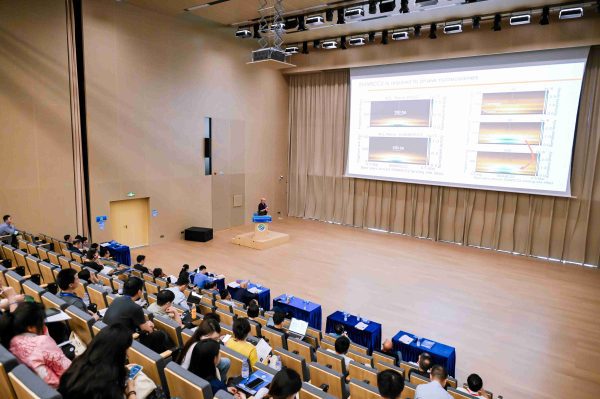News Express: UM, Shenzhen University of Advanced Technology jointly organise international conference on regenerative medicine
新聞快訊:澳大與深理工合辦再生醫學國際會議

澳大與深理工合辦再生醫學國際會議
UM and Shenzhen University of Advanced Technology jointly organise an international conference on regenerative medicine
澳大與深理工合辦再生醫學國際會議
澳門大學健康科學學院與深圳理工大學合辦的“第四屆粵港澳大灣區再生醫學國際會議”於5月17日至18日在深圳理工大學舉行。會議匯聚來自中國內地、港澳以及美國、韓國、日本、新加坡約一百位知名學者、臨床醫學專家、行業專業人士、研究人員及學生,共同深入探討再生醫學的最新進展和臨床轉化。
澳大副校長葛偉在致辭中表示,粵港澳大灣區是中國醫療科技發展的重要戰略區域,澳大致力培養生物醫學研究和再生醫學領域的傑出人才,為粵港澳大灣區生物醫藥產業的可持續發展提供必要的推動力。是次與深圳理工大學共同舉辦會議,不僅深化了兩校的學術交流與合作,也為兩校師生提供了寶貴的交流機會。
深圳理工大學教務長趙偉在致辭中指出,全球人口老齡化和慢性疾病的快速增長,對先進醫療解決方案提出了前所未有的需求。傳統治療手段失效時,再生醫學為修復或替換受損組織和器官提供了突破性解決方案。因此,粵港澳大灣區正在建設一個由迫切臨床需求和前沿研究能力共同驅動的一流創新生態系統。他亦表示,是次會議為創新研究思想的交流搭建了平台,並為學生和年輕科學家學習和合作提供了機會。
是次會議共設有四場主題演講和22場分論壇學術報告。在主題演講環節,澳大健康科學學院院長鄧初夏回顧了腫瘤治療面臨的新挑戰、策略及改進成果,尤其是他最近提出的腫瘤細胞通過蛋白損傷反應(PDR)產生廣譜耐藥的新機制;中國科學院深圳先進技術研究院教授徐富強概述了其實驗室開發的病毒載體研究與應用進展;深圳理工大學合成生物學學院教授連祺周分享了從開發遺傳性脂質貯積症疾病模型到細胞和基因治療(CGT)臨床應用的十年歷程;海軍軍醫大學第二附屬醫院教授徐滬濟介紹了其利用異體CAR-T細胞治療自身免疫性疾病的開創性貢獻。
澳大健康科學學院副院長徐仁和、深圳理工大學教授連祺周及深圳先進院教授李剛共同擔任是次會議的組委會聯合主席。澳大共十位教授參與會議,其中四位發表報告,五位擔任主持。今年會議重點關注四大關鍵領域——幹細胞技術、人工智能在醫學中的應用、合成生物學進展、CAR-T細胞療法。此外,會議還設有青年科學家論壇,用於學術交流和展示科研成果,八位海報展示者獲得獎項。
欲瀏覽官網版可登入以下連結:
https://www.um.edu.mo/zh-hant/news-and-press-releases/press-release/detail/61266/
UM, Shenzhen University of Advanced Technology jointly organise international conference on regenerative medicine
The 4th Guangdong-Hong Kong-Macau Greater Bay Area International Conference on Regenerative Medicine, jointly organised by the Faculty of Health Sciences (FHS) of the University of Macau (UM) and Shenzhen University of Advanced Technology (SUAT), took place on 17 and 18 May at SUAT. The conference brought together about 100 renowned scholars, clinical medicine experts, industry professionals, researchers, and students from mainland China, Hong Kong, Macao, the US, South Korea, Japan, and Singapore. Attendees engaged in in-depth discussions on the latest developments in regenerative medicine and its clinical applications.
Ge Wei, vice rector of UM, said in his speech that the Guangdong-Hong Kong-Macao Greater Bay Area is a key region for the development of medical science and technology in China. UM is committed to cultivating outstanding talent in biomedical research and regenerative medicine, providing the driving force for sustainable development of the biomedical industry in the Greater Bay Area. He added that the conference would not only deepen academic exchanges and cooperation between UM and SUAT, but also provide a valuable opportunity for student and faculty from both universities to exchange ideas.
Zhao Wei, registrar of SUAT, said in his speech that the rapid increase in ageing populations and chronic diseases worldwide has generated an unprecedented demand for advanced medical solutions. He noted that, when traditional treatments fail, regenerative medicine can deliver breakthrough solutions for repairing or replacing damaged tissues and organs. Therefore, the Greater Bay Area is developing a top-tier innovation ecosystem, driven by urgent clinical needs and cutting-edge research capabilities. He added that the conference would provide a platform for the exchange of innovative research ideas, as well as learning and collaboration opportunities for students and young scientists.
The conference featured four keynote lectures and 22 academic presentations. During the keynote session, Deng Chuxia, dean of UM FHS, provided an overview of the latest challenges, strategies, and advancements in cancer treatment. He also presented his recent discovery of a novel mechanism through which tumour cells develop broad drug resistance via protein damage response (PDR). Xu Fuqiang, professor at the Shenzhen Institute of Advanced Technology (SIAT) of the Chinese Academy of Sciences, provided an update on the latest research and applications of viral vectors developed in his laboratory. Lian Qizhou, professor in the Faculty of Synthetic Biology at SUAT, shared his ten-year research journey, which has taken him from developing disease models for inherited lipid storage diseases to the clinical application of a cell and gene therapy (CGT). Xu Huji, professor at the Second Affiliated Hospital of the Naval Medical University, presented his pioneering research on the use of allogeneic CAR-T cells to treat autoimmune diseases.
The organising committee of the conference was co-chaired by Xu Renhe, associate dean of UM FHS; Lian Qizhou, professor at SUAT; and Li Gang, professor at SIAT. Ten UM professors participated in the conference, four of whom delivered presentations and five served as moderators. This year’s conference focused on four key areas: stem cell technologies, AI applications in medicine, advances in synthetic biology, and CAR-T cell therapies. In addition, the conference included Young Scientists’ Presentations to facilitate academic exchange and present research projects by young scientists. Eight poster presenters received awards for their outstanding work.
To read the news on UM’s official website, please visit the following link:
https://www.um.edu.mo/news-and-press-releases/press-release/detail/61266/